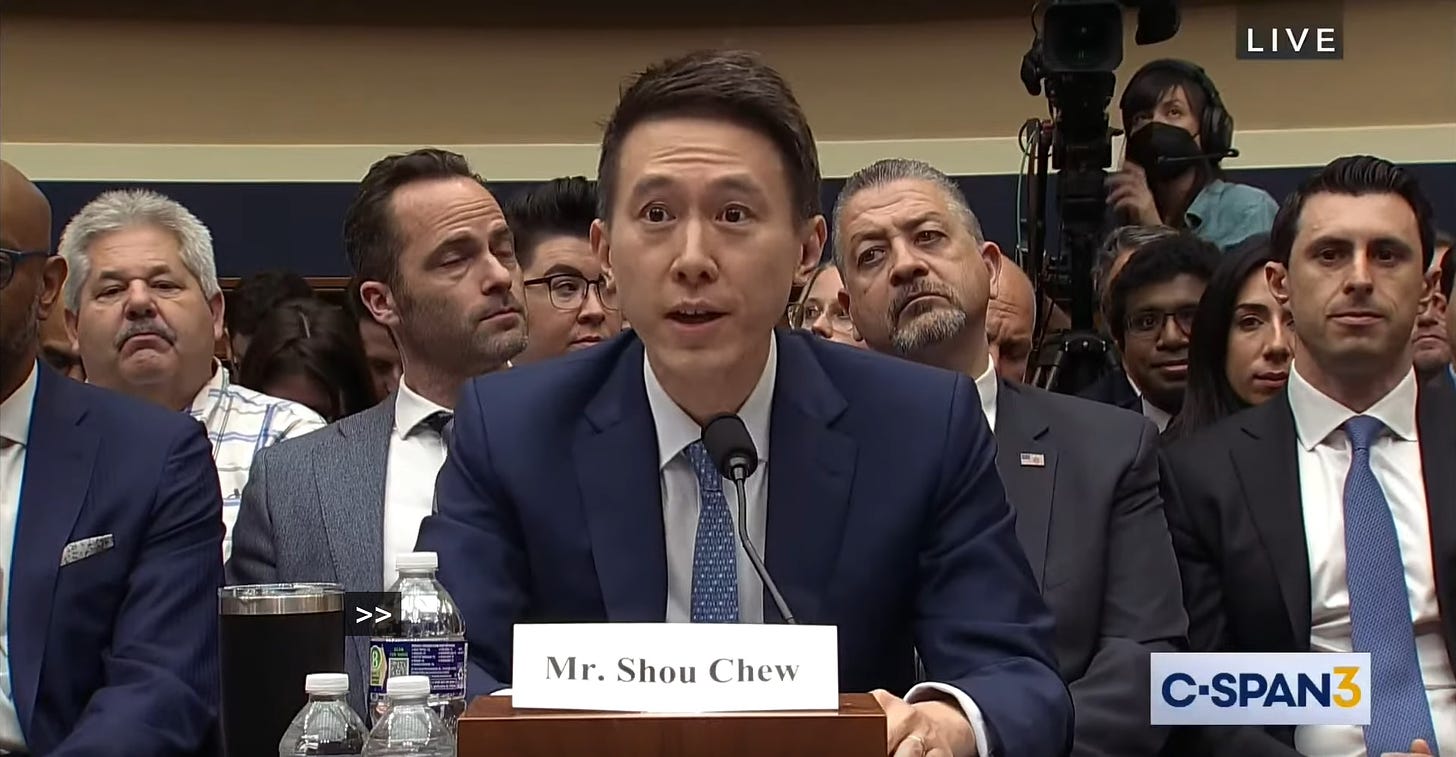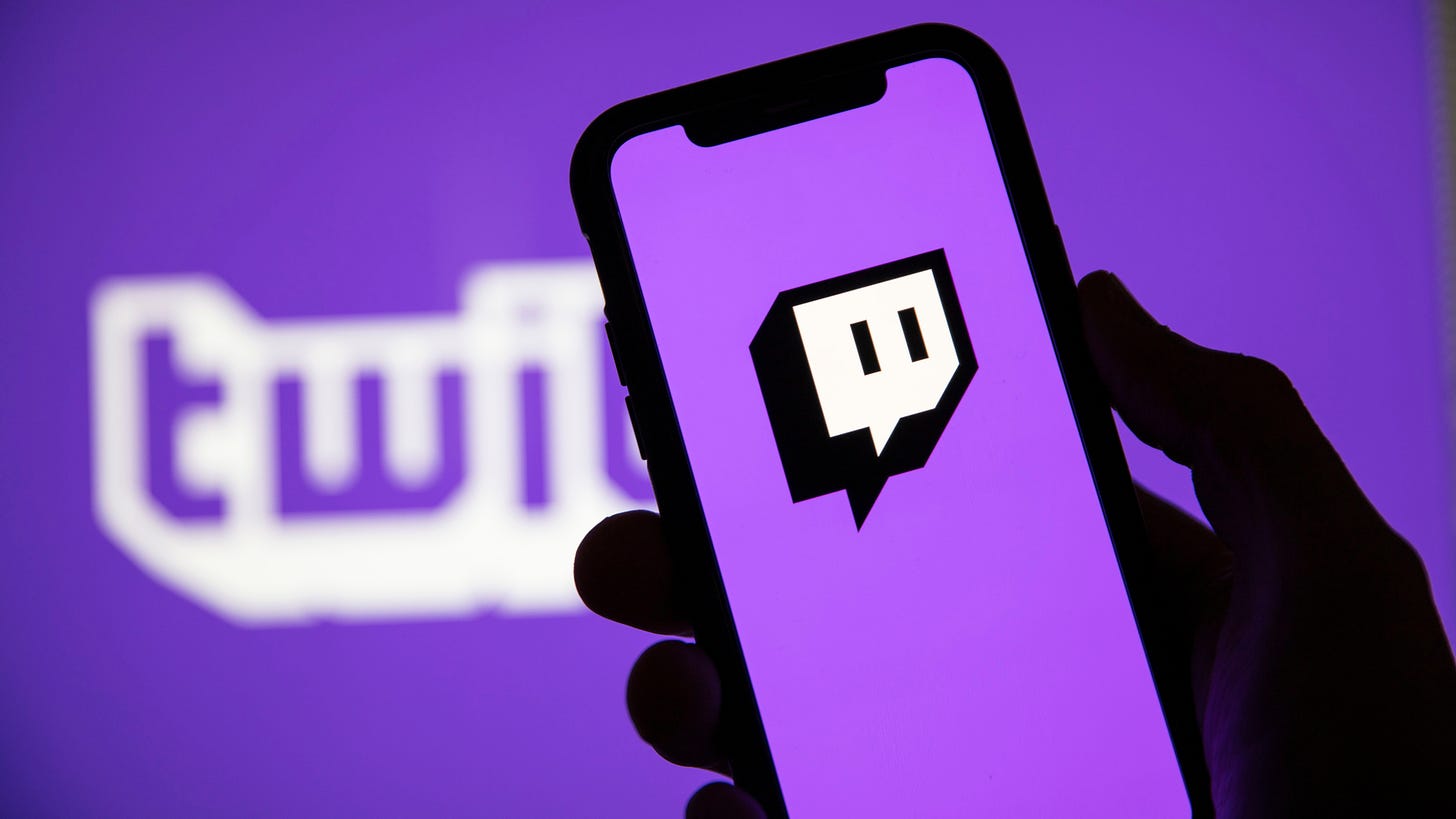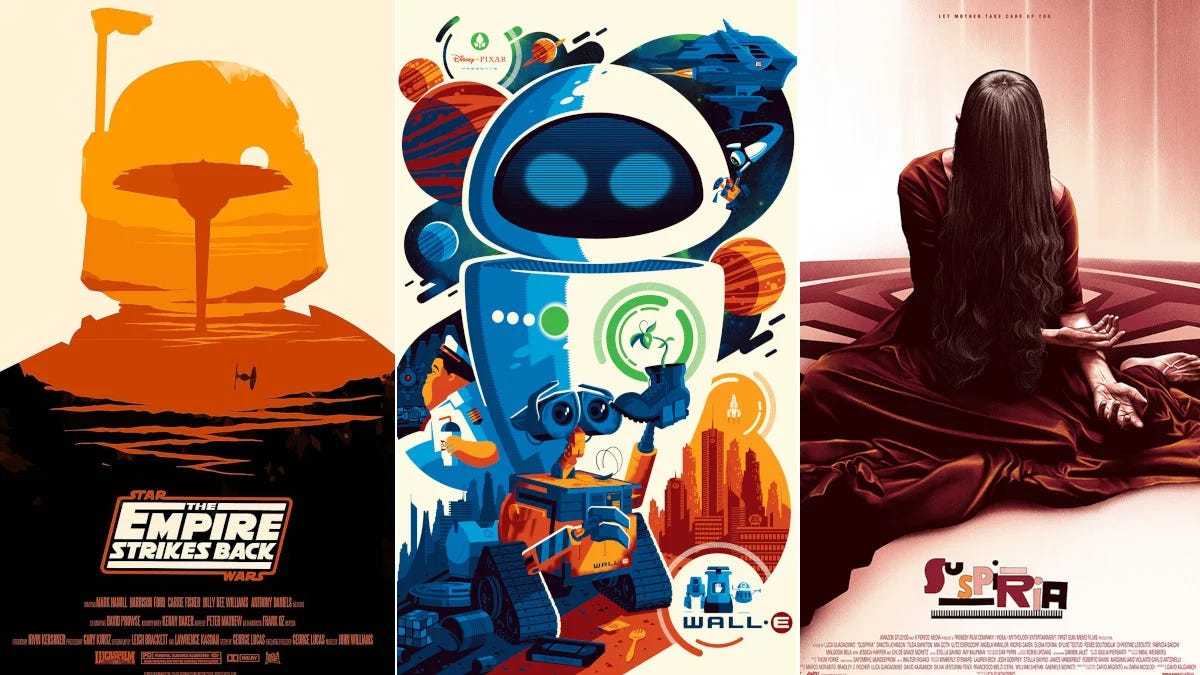Stuff Worth Knowing for the Week of March 20, 2023
TikTok goes to Capitol Hill, Valve announces Counter-Strike 2, the CMA sides with Microsoft, and Disney fires a major Marvel exec.
Stuff Worth Knowing for the Week of March 20, 2023
Welcome back to Stuff Worth Knowing! Each week, I'll round up news related to tech, video games, film, television, anime, and more. At the end of each newsletter, there will be a section called On The Calendar, which will include some of those notable dates that are near-term. Oh, and I also launched my Patreon, SavePhile, where my more thoughtful musings on any topic will go. Big week this week!
Tech ⌨️
TikTok CEO Testifies in Front of an Unhinged Congress
The biggest story this week was absolutely TikTok vs. Congress. TikTok CEO Shou Zi Chew, who most people hadn’t really seen until this week, came to Capitol Hill to testify in front of Congress. The House Energy & Commerce Committee hearing began on Thursday.
Prior to the hearing, TikTok got all of its ducks in a row. If you’ve been on any ad-supported streaming service this week, you’ve probably seen one of TikTok’s many ads touting the positive nature of the platform. Before he appeared in front of Congress, Chew appeared on TikTok itself in his best casual CEO wear, explaining to users what the U.S. government could do to the app and asking users to defend it. A number of major influencers even came to D.C. on Wednesday to speak out in favor of TikTok.
Other tech CEOs have testified in front of Congress and it didn’t go much better for Chew. In his opening statements, he acknowledged the primary fear of the U.S. government: that TikTok is sending user data to the Chinese government. He began by talking about his personal background, being born in Singapore and doing his higher education in the United States, before addressing the government concerns head on.
“Let me start by addressing a few misconceptions about ByteDance, of which we are a subsidiary. ByteDance is not owned or controlled by the Chinese government. It’s a private company,” he began, “I understand that there are concerns stemming from the inaccurate belief that TikTok’s corporate structure makes it beholden to the Chinese government or that it shares information about U.S. users with the Chinese government. This is emphatically untrue.”
This slides by issues like the Chinese golden shares and the appointment of a government official to ByteDance’s board, but Chew is largely correct. TikTok itself is technically operating in the U.S. and once its $1.5 billion “Project Texas” plan—which moves all user data to Oracle in Austin, Texas—the data would be under the control of a U.S. entity. Lawmakers still have issues with ByteDance’s overall control of the algorithm, however.
Chew was grilled over other concerns, like how children engage with the app, noting that teenagers can bypass the 60-minute watch limit. Lawmakers called out issues with misinformation and censorship, like former NBA player Enes Kanter Freedom finding his account banned after his political activism against China. (The account was unbanned this week.) They also mentioned an incident where ByteDance employees accessed the private user data and location of several U.S. journalists. Chew’s answer for that situation was less than adequate: "I don't think that spying is the right way to describe it."
Why It's Worth Knowing: Ultimately, Chew probably didn’t win TikTok any leeway from the U.S. government. One thing that became increasingly clear was that lawmakers had very little idea about technology, and there were some concerns nearing clear xenophobia as well.
The biggest issue between the U.S. and Chinese governments is ByteDance divesting TikTok. The Biden administration is pushing for a full divestment, something that Chew said wouldn’t remedy the issues that the administration has. “Divestment doesn’t address the fundamental concerns that I have heard, as a change in ownership would not impose any new restrictions on data flows or access,” he explained.
The issue is that the Chinese government is willing to go to bat for TikTok. Commerce Ministry spokeswoman Shu Jueting said that China would “firmly oppose” the sale of TikTok. That statement didn’t reflect well on TikTok during the hearing, as it seemed to point toward the company being under Chinese control. So Biden needs to figure out how to move forward, given China’s opposition, sentiment from U.S. lawmakers, and TikTok’s own considerable user base in the United States.
Other companies are watching and waiting. They’re already copying TikTok’s features and UI in various ways, like Instagram Reels, YouTube Shorts, and even new visual playlists in Spotify. If the app gets banned, the competition could have the opportunity to clean up.
The Shout-Out: The Verge’s Alex Cranz takes a look at the more xenophobic side of the TikTok hearings.
Linus Tech Tips Recovers From Being Hacked
On Friday, one of the largest YouTube tech channels and networks found itself hacked. That morning, Linus Tech Tips started posting crypto scam videos to its 15.3 million subscribers. Then other Linus Media Group YouTube channels, including Techquickie and TechLinked, also found themselves compromised in the attack.
YouTube was quick to ban the main account while it got control of it again. “After being alerted by the Linus Tech Tips team that their account was compromised due to unauthorized access, our team investigated the issue and worked with them to secure and restore their account,” YouTube spokesperson Elena Hernandez told The Verge.
According to Sebastian, a member of his team downloaded a sponsorship offer and clicked on a PDF that included malware. This allowed the hacker to gain browser session tokens, which allowed them to access the Linus Tech Tips YouTube account. By midday, Linus Tech Tips was back under the control of owner Linus Sebastian again. Sebastian addressed the issues in a video posted on the channel once it was back under control. For his part, he wants greater security controls, like the requirement of a password or two-factor authentication prior to renaming a channel or deleting a ton of videos.
This Week in Twitter: Legacy Blue Checks Are Going Away, But Blue Users Can Hide Their Checks
On Thursday, Twitter’s official Verified account announced that its legacy verified program is going away. “On April 1st, we will begin winding down our legacy verified program and removing legacy verified checkmarks,” said the company on Twitter. This means the only verification that will remain is Twitter Blue subscriptions or the Verified Organization program. (April 1st seems to be a bad day to sunset…)
The same day, the company also announced that Twitter Blue is now available globally. The tweet touts new features like “prioritized ranking in conversations, half ads, long Tweets, Bookmark Folders, custom navigation, Edit Tweet, Undo Tweet, and more,” but a number of those features aren’t actually live. “Half ads” for example, is about subscribers having a lower number of ads served to them, a feature that isn’t live on Twitter Blue yet.
While some features are missing, Twitter is working on a feature that will allow users to hide their checkmarks. The internet as a whole has made paid blue checkmarks a scarlet letter, to the point that it’s a bonus that some folks can hide it. The potential feature was first noticed by mobile developer Alessandro Paluzzi on Twitter.
Twitter is doing all of this work so Musk can make any money on the flagging company. Sadly, none of it seems to be working. According to app firm Sensor Tower, Twitter Blue has only made $11 million mobile subscriptions since its relaunch. Combined with Twitter’s monthly revenue being down more than 60% from October 2022 to January 2023, and the numbers aren’t pretty.
Video Games 🎮
Valve Software Officially Announces Counter-Strike 2
It seems Valve can make a sequel to one of its beloved games! This week, the company announced Counter-Strike 2, a new entry in a franchise that hasn’t had a release since 2012’s Counter-Strike: Global Offensive. The sequel is built seemingly on top of the bones of CS:GO, and it’ll actually be a free upgrade for the original title.
Valve also showed off one of the new features coming to CS2, Responsive Smokes. The released video highlights the new smoke bombs, which are dynamic volumetric clouds that react to gunfire, explosions, and level lighting. It’s impressive technology and only the first new feature coming to the sequel.
Counter-Strike 2 will have a limited test soon and the full game is coming this summer.
Why It's Worth Knowing: Counter-Strike: Global Offensive remains one of the most popular and consistently played games on Steam to this day. It’s a game that continues to draw in players and make money, alongside other forever titles like Dota 2, Apex Legends, PUBG, and Grand Theft Auto V. It is a big deal that a sequel is coming and it’s an even bigger deal that Valve Software is making a new game or sizable update at all.
UK’s CMA Moves Into Microsoft’s Corner in Provisional Findings
The UK’s Competition and Markets Authority has apparently changed the stance in its provisional findings. Following a lengthy consultation period, the CMA is now leaning on Microsoft’s side in its proposed acquisition of Activision-Blizzard. In the regulator’s own words, it has decided to narrow the scope of its concerns.
“The most significant new evidence provided to the CMA relates to Microsoft’s financial incentives to make Activision’s games, including Call of Duty (CoD), exclusive to its own consoles,” said the CMA in its press release.
“While the CMA’s original analysis indicated that this strategy would be profitable under most scenarios, new data (which provides better insight into the actual purchasing behavior of CoD gamers) indicates that this strategy would be significantly loss-making under any plausible scenario. On this basis, the updated analysis now shows that it would not be commercially beneficial to Microsoft to make CoD exclusive to Xbox following the deal, but that Microsoft will instead still have the incentive to continue to make the game available on PlayStation.”
Microsoft was also the subject of a pair of stories that could push the remaining regulatory bodies, the U.S. Federal Trade Commission and the European Commission, in different directions. The first story came on Monday, when California judge Jacqueline Corley dismissed a lawsuit made by a number of Call of Duty gamers. The plaintiffs were worried that Microsoft’s acquisition would deprive them of future Call of Duty titles. In documents obtained by Ars Technica, the court said that Microsoft’s acquisition of Activision-Blizzard does not create “a reasonable probability of anticompetitive effects in any relevant market.”
On the flip side, there was a concrete example of potential anticompetitive practices following an acquisition. In an interview with IGN France, Arkane Studios’ Harvey Smith acknowledged that a PlayStation 5 version of the upcoming first-person shooter Redfall was in development, but was scrapped following Microsoft acquiring Zenimax. Smith noted: “We got bought by Microsoft and that was a huge sea change. They said, ‘no PlayStation 5. Now we’re gonna do Game Pass, Xbox, and PC.’” That would point to the issue that the CMA originally noted in its previous provisional findings.
The investigation is still ongoing. The CMA’s final report is due by April 26, 2023 and it’s possible that the regulator could lean in the other direction when everything washes out. Still, the organization’s statement, “having considered the additional evidence provided, we have now provisionally concluded that the merger will not result in a substantial lessening of competition in console gaming services because the cost to Microsoft of withholding Call of Duty from PlayStation would outweigh any gains from taking such action,” is a pretty strong one.
Microsoft Planning A New Mobile App Store
While all of the regional regulatory bodies are worried about Call of Duty, it seems that Microsoft is dreaming bigger with its planned acquisition. In an interview with the Financial Times, Xbox boss Phil Spencer admitted that the company is looking to build a mobile app store.
"We want to be in a position to offer Xbox and content from both us and our third-party partners across any screen where somebody would want to play," Spencer stated. "Today, we can't do that on mobile devices but we want to build towards a world that we think will be coming where those devices are opened up."
The reason Microsoft is revisiting the idea of its own app store is because of the European Digital Markets Act. The act will require major platforms owned by Apple and Google to open those platforms to app stores from other companies. “The Digital Markets Act that's coming—those are the kinds of things that we are planning for. I think it's a huge opportunity,” said Spencer.
Why It's Worth Knowing: Everyone is focused on Call of Duty, but it’s clear that another ringer here would be King, Activision-Blizzard mobile division. Between King’s Candy Crush Saga, Bethesda’s Mighty Doom, and Activision’s Call of Duty: Mobile, Microsoft would have three of the top 15 iPhone games on the Apple App Store chart as of this writing. Mobile money is still big money, even if some folks don’t think about it. The Microsoft Store for apps still exists, but most folks don’t think about it at all. If a new mobile app store is able to launch on iOS or Android with a nice stable of games behind it, there could be some movement there.
Epic Games Is Bringing Together Its Various Marketplaces With Fab
Epic Games has slowly acquired a stable of marketplaces focused on digital assets and digital creation. These marketplaces include Unreal Engine Marketplace, Quixel Bridge, Artstation Marketplace, and Sketchfab. Alongside other announcements at GDC 2023 this week, Epic Games announced that it would be combining these various markets into a single destination called Fab.
“Fab will bring together a massive community where creators will earn an 88% revenue share, and the marketplace will host all types of digital content including 3D models, materials, sound, VFX, digital humans, and more; supporting all engines, all metaverse-inspired games which support imported content, and the most popular digital content creation packages,” said the company in a blog post on its GDC 2023 announcements.
An alpha version of Fab is already live as a plugin for the new Unreal Editor For Fortnite (UEFN), which was released this week.
AI 🤖
OpenAI Expands ChatGPT With Plug-Ins
Last week, OpenAI revealed its GPT-4 large language model, which was already powering Microsoft’s new Bing. This week, the company announced that it was adding support for plug-ins in ChatGPT, allowing the chatbot to reach out to the wider web for information. The feature is currently just in alpha testing.
“Users have been asking for plugins since we launched ChatGPT (and many developers are experimenting with similar ideas) because they unlock a vast range of possible use cases. We’re starting with a small set of users and are planning to gradually roll out larger-scale access as we learn more (for plugin developers, ChatGPT users, and after an alpha period, API users who would like to integrate plugins into their products). We’re excited to build a community shaping the future of the human–AI interaction paradigm,” the company stated in the announcement post.
OpenAI launched the feature with its own Browsing plug-in, which allows the chatbot to access the internet. In its documentation, the company also says the feature will allow the bot to tap into existing APIs. OpenAI believes this will eventually allow the AI to perform a number of helpful tasks, like retrieving personal notes or ordering food.
Why It's Worth Knowing: Previously, ChatGPT was only able to talk to its users in interesting and misleading ways. With plug-ins, the bot is opened up to a wide variety of new experiences, some akin to the AI assistants of fiction. Of course, the issue is ChatGPT already has issues with outright lies and weird errors, so it’s a question of if you want that bot to have access to your wallet to make purchases. Still, this will open the floodgates to things great and terrible.
Ubisoft’s Ghostwriter AI Tool Will Help With NPC Chatter
This week at GDC 2023, Ubisoft revealed Ghostwriter, an AI-powered content generation tool aimed at making its open worlds easier to build. Ghostwriter was built by Ubisoft La Forge to help its writing teams populate its open worlds, allowing writers to quickly write “barks” for non-player characters.
Barks are the errant conversations and phrases that NPCs say while you’re wandering through a game. If you hear a random background character in Watch Dogs talk about lunch, that’s a bark. Those generally have to be written by scriptwriters. Ghostwriter lets these writers give the tool a prompt, which then generates a number of example barks. The writer then has to choose the best options, which narrows down the process a second time.
In a talk explaining Ghostwriter attended by Game Developer, Ubisoft La Forge researcher Ben Swanson said that the technology is not used for story, cinematics, or lore within the company. In the talk and adjoining trailer for the tool, Ubisoft stressed that human feedback was needed for the process to work.
"If you're trying to build these systems, keep lines of communication and talk to narrative designers and scriptwriters," said Swanson. "Make sure you're not inventing a tool nobody needs."
Canva Leans On AI With New Features
You might not have heard of Canva before, but it’s one of the fastest growing services at the moment, boasting 120 million monthly users. It's an app that allows users to quickly design art for work and personal projects. It’s Adobe InDesign without the hassle. Websites, posters, business cards, book covers; Canva allows users to whip up designs quickly for free, while also offering paid Pro and Teams features.
Like every other major tech company, Canva is adding AI tools to its product. This week the company announced Magic Write, a new AI assistant that can help users create “copy, blog outlines, lists, bio captions, content ideas, brainstorms, and more”. It’s similar to the tools already being added to Microsoft Office and Google Workspace, just for a slightly different purpose. The company also revealed Magic Edit, which allows users to remove items or people from photos, and also add objects based on prompts.
Why It's Worth Knowing: “Ubiquity” is the key word here. AI tools are coming to every facet of our lives. Many have been there for years and we’ve just not thought about them. But AI-generated content is only going to grow, especially as it becomes a firm part of the biggest apps and services around. How we handle that fact is still up in the air.
Film, Television, and Streaming 🎞️
Disney Fires Marvel Studios Exec Victoria Alonso
In a surprise move, Disney kicked off the week by firing Victoria Alonso, Marvel Studios president, physical and postproduction, visual effects, and animation production. It was a bit shocking as Alonso was the most high-profile executive in Marvel Studios outside of boss Kevin Fiege.
The reasons for the dismissal were unclear when The Hollywood Reporter first broke the news, but the drama quickly started. Many assumed that Alonso was the sacrificial lamb for Marvel’s recent box office underperformance, alongside the consistent stories of VFX studio mistreatment, which would fall under Alonso’s purview. It would make sense that Bob Iger might cut an executive from Marvel as a sign that he was getting things under control in his return to Disney.
A few days later, THR followed with what it purported to be the real reason for Alonso’s firing. The trade reports that Alonso produced the Oscar-nominated Argentina, 1985, which was in breach of her Disney contract. Apparently the company let that slide, telling Alonso not to promote the film, a demand that she subsequently ignored. Once the Oscars were over, Alonso was terminated for cause.
Alonso’s attorney disputes the situation in a statement: “The idea that Victoria was fired over a handful of press interviews relating to a personal passion project about human rights and democracy that was nominated for an Oscar and which she got Disney’s blessing to work on is absolutely ridiculous. Victoria, a gay Latina who had the courage to criticize Disney, was silenced. Then she was terminated when she refused to do something she believed was reprehensible. Disney and Marvel made a really poor decision that will have serious consequences. There is a lot more to this story and Victoria will be telling it shortly—in one forum or another.”
Why It's Worth Knowing: Again, Alonso was one of the more high profile executives within Marvel Studios. She’s been with the company since 2006, when she joined as chief of visual effects and postproduction and co-producer on the then-upcoming Iron Man. She then moved into an executive producer role on most of the studio’s films, becoming the executive vice president of production, and then president, physical and postproduction, visual effects, and animation production.
She has been a visible part of Marvel Studios for years and now she’s gone. Not only does that hole need to be filled, but how it gets filled will affect future Marvel projects. And that’s before you get into all the Hollywood drama that her lawyer’s statement portends. It’s going to be messy!
The Next Star Wars Films Loses The Lost Writer
Star Wars has had a hard time at the box office. The Rise of Skywalker was a misstep as the end of a saga and Lucasfilm has yet to produce another film. Things were looking up in October, when Deadline reported that the next Star Wars film was set. Sharmeen Obaid-Chinoy was set to direct, with Lost and Watchmen showrunner Damon Lindelof penning the script with screenwriter Justin Britt-Gibson.
This week, the project seemed to hit the skids when it was announced that Lindelof and Britt-Gibson had left the project after turning in their script.
Lindelof seemingly hinted at this departure in an interview with SlashFilm: “I will just say, that for reasons that I can't get into on this Sunday morning, on this day, the degree of difficulty is extremely, extremely, extremely high. If it can't be great, it shouldn't exist. That's all I'll say, because I have the same association with it as you do, which is, it's the first movie I saw sitting in my dad's lap, four years old, May of '77. I think it's possible that sometimes when you hold something in such high reverence and esteem, you start to get in the kitchen and you just go, 'Maybe I shouldn't be cooking. Maybe I should just be eating.' We'll just leave it at that point."
The news of Lindelof leaving the project was quickly followed by Variety’s report of the replacement: Peaky Blinders creator Steven Knight is now penning the script. The film is apparently still on track, with details being officially announced at the upcoming Star Wars Celebration in London. (Despite all the news and movement, the film has actually never been officially announced.)
Why It's Worth Knowing: Star Wars might be riding high on Disney+, but the film side has hit a wall. There is a whole graveyard of former creatives assigned to Star Wars films. The list includes Jurassic World director Colin Tervorrow, Game of Thrones creators David Benioff and D.B. Weiss, Wonder Woman director Patty Jenkins, Marvel Studios boss Kevin Fiege, and Devotion director J.D. Dillard. Phil Lord and Christopher Miller, who directed The Lego Movie and 21 Jump Street, were removed from Solo as well. The remaining films in the hopper include Taika Waititi’s planned film, a possible project from Night at the Museum and Free Guy director Shawn Levy, and Rian Johnson’s trilogy, which has yet to be officially canceled.
Making films is hard, but it paints a messy picture at Lucasfilm, or at least a situation where signed creatives can’t work with management. It’s also clear that Lucasfilm is now trying to hit a planned December 2025 release with its next film. Any film that does release needs to be a hit, as it essentially needs to establish Star Wars on the big screen again. This is probably putting a ton of pressure on Lucasfilm and any creative team that signs onto the project.
Apple Spending Over $1 Billion To Make a Theatrical Impact
Apple is slowly working its way forward in the content business. Apple TV+ has been slowly marching forward with quality shows like Shrinking, For All Mankind, Severance, and Ted Lasso. It’s missing a few hits to legitimately turn it into “second HBO,” but they’re trending in the right direction.
Now the company is planning to do the same when it comes to the silver screen. According to a report by Bloomberg, Apple is planning to spend over $1 billion a year to produce theatrical films. The company has been spending big on projects from veteran talent. This includes $150-200 million for Martin Scorsese’s Killers of the Flower Moon (pictured above), $200 million for Matthew Vaughn spy thriller Argylle, and $200 million on an F1 film starring Brad Pitt from Top Gun: Maverick director Joseph Kosinski. The company is also working with Ridley Scott on Napoleon, which doesn’t have a budget, but it’s a historical drama, so it probably won’t be cheap.
Why It's Worth Knowing: Everybody else is starting to cut back, but Apple is moving forward. Netflix just walked away from a $150 million romantic comedy, while Apple is here spending more on films that’ll likely do as well at the box office. They’ll probably be great films, but very few companies have money for days like Apple does. And while they do, I’m glad they’ll be spending some of that money on some great movies. (Would be nice if the money went to more diverse directors, but I digress…)
WGA Floating Proposal for the Limited Use of AI Tools
On Tuesday, Variety reported that the Writers Guild of America was entertaining a proposal that would allow AI-generation for scripts, as long as writers retained credits. It would allow a writer to generate a script using AI, or allow the studio to potentially rewrite parts of a script with AI tools. The proposal apparently appeared in the first bargaining session with the Alliance of Motion Picture and Television Producers (AMPTP).
A day later, the WGA East took to Twitter to clarify the proposal and quell the growing rage at Variety’s report. In its Twitter thread, the WGA stressed that it wants to protect its members.
“AI can’t be used as source material, to create [Minimum Basic Agreement]-covered writing or rewrite MBA-covered work, and AI-generated text cannot be considered in determining writing credits,” said the guild. “Our proposal is that writers may not be assigned AI-generated material to adapt, nor may AI software generate covered literary material. In the same way that a studio may point to a Wikipedia article, or other research material, and ask the writer to refer to it, they can make the writer aware of AI-generated content. But, like all research material, it has no role in guild-covered work, nor in the chain of title in the intellectual property.”
Why It's Worth Knowing: Like many other creative fields, the WGA has to grapple with using AI tools for its work. There are some methods that are probably fine, like having an AI tool generate prompts or rewrite a sentence or two, but others like having a large language model generate an entire script or extensively rewrite an existing script are existential problems. It’s bargaining time for the guild, meaning now is the time to get those details hammered out. In its statement, the guild is clear that it believes that AI-generated content is akin to plagiarism, so that does offer some idea of where it’ll lean in negotiations.
Books 🎞️
Federal Judge Sides With Book Publishers In Internet Archive Case
In an opinion released on Friday, federal judge John G. Koeltl sided with a number of large book publishers, stating that the Internet Archive infringed on their copyrights by scanning and lending out their books. The text of the opinion was obtained by Publishers Weekly, and it’s clear that the judge was firmly with book publishers on the matter.
“At bottom, IA’s fair use defense rests on the notion that lawfully acquiring a copyrighted print book entitles the recipient to make an unauthorized copy and distribute it in place of the print book, so long as it does not simultaneously lend the print book,” wrote the judge in his opinion. “But no case or legal principle supports that notion. Every authority points the other direction. Of course, IA remains entitled to scan and distribute the many public domain books in its collection.”
The case was made against the Internet Archive by four of the largest publishers—Hachette Book Group, Inc., HarperCollins Publishers LLC, John Wiley & Sons., Inc., and Penguin Random House LLC—who contend that the Internet Archive contains more than 30,000 examples of their copyrighted works. It’s a tough blow for the IA, something the organization acknowledged in its own statement.
“This decision impacts libraries across the US who rely on controlled digital lending to connect their patrons with books online. It hurts authors by saying that unfair licensing models are the only way their books can be read online. And it holds back access to information in the digital age, harming all readers, everywhere,” the organization stated. “But it’s not over—we will keep fighting for the traditional right of libraries to own, lend, and preserve books. We will be appealing the judgment and encourage everyone to come together as a community to support libraries against this attack by corporate publishers.”
Layoffs 👷
Amazon Will Lay Off Another 9,000 Employees
Earlier this year, Amazon began cutting employees, with a total of 18,000 employees laid off. Like many of its tech compatriots however, it seems that was just the first round. The New York Times reported this week that Amazon was going to lay off another 9,000 employees. The business segments affected were meant to include the cloud computing business, advertising, and even Twitch.
The issue was that employees were notified of the potential layoffs on Monday, but many weren’t notified of their employment status until later. Digital Photography Review, a site publishing camera review owned by Amazon, found out that its entire operation was shutting down on Tuesday. (The site will be active until April 10.)
Game streaming platform Twitch didn’t start notifying its employees about which ones would be leaving the company until Friday, creating a Sword of Damocles over its entire workforce for a week. Reporter Nathan Grayson, who himself was just laid off from the Washington Post, noted that the cuts seem to have hit the customer support departments rather hard. In total, more than 400 employees have been cut from Twitch.
For its fourth quarter financial results ended on December 31, 2022, Amazon reported a net sales increase of 9% to $149.2 billion. Net income decreased to $300 million during the quarter, with a net loss of $2.7 billion for the full year.
Funko Cuts Mondo Operations Only A Year After Acquisition
Both The Wrap and Gizmodo have reported that Funko has laid off half of the employees in its Mondo division. Mondo did posters, toys, and records, leaning on great artists to create unique designs based on some of their favorite brands. The company was acquired by Funko in June 2022, when it purchased the division from the Alamo Drafthouse.
The layoffs included Mondo co-founders Mitch Putnam and Rob Jones, alongside senior creative director Eric Garza. The poster division has shut down entirely according to The Wrap, leaving the toy and vinyl music divisions. It remains to be seen how long those will last.
The layoffs remove some of the magic from what Mondo did. “To me, the heart of Mondo’s artistic vision laid with the staff that was let go, and I’m nervous about ongoing and future planned projects continuing with the same enthusiasm and support,” one anonymous artist told Gizmodo. “I’d love to continue working with Mondo but if they become a pale imitation of what they were, I’m sure many of us artists in the scene will migrate to wherever creative staff transitions to in the future.”
For its last financial earnings report, Funko reported a net sales increase for 2022 to $1.3 billion, with a net loss of $5.2 million
On My Mind 🧠
John Wick Director On Shooting Action And Stunts At the Oscars: This weekend marks the release of John Wick: Chapter 4, which is currently the last primary entry in the indie action series. Deadline sat down with Chad Stahelski, who has been on board with the franchise since the beginning. Stahelski had some interesting comments about pulling off Wick’s action on budgets much lower than its contemporaries:
We’re like, “All right, but what if we didn’t do it that way? What if we spent all the money in prep?” And we prepped for 30 weeks with the camera guys. Most times the cameramen, even the directors, don’t see the fight scene until they walk on set. The stunt guys are shooting the pre-vis and all this stuff, but the actual camera guys and the actual cinematographer don’t. And then you get on set and you wonder why they only get five setups a day. I get 30 to 50.
You see Keanu running through traffic in the Arc de Triomphe, and you don’t realize it but there are two camera crews in that traffic as well; these camera guys are dodging the cars as are the actors. That’s how we get those shots, and if you think you can get that without rehearsal, you are wrong. I spend at least twice as much location scouting, at least twice as much as like literally the biggest shows that you can go see.
I’ll spend more on location scouting and rehearsals than they ever will. I bring in my wardrobe, makeup teams, everybody for the stunt rehearsals. So when people walk on set, we have a plan. We know exactly what we’re shooting. It’s not just everybody running around with their heads cut off, trying to get their head around what we’re doing. Everybody’s seen it a dozen times by the time we shoot. That’s why we are so efficient. We actually prep. Most people just spend the money on prep, but they don’t actually prep.
The next thing is, you know bring the right people. What good is it for me to spend $5 million on my stunt guys with Keanu training for 10 weeks, and not train the camera guys? Who do you think shoots it? This is madness to me. Like every other show, they don’t pay for the camera guys to be in the weeks of prep. So how do you think that’s gonna go? [Laughs]. Or, they’ll only pay for like three stunt guys to do the rehearsals and then on the day they’ll bring in the local stunt guys to save money. But the local stunt guys haven’t seen the fight yet. And then Keanu’s gonna fight with guys he’s never met before. Again, how do you think that’s gonna go?
It drove everybody mad for the first two films, like I’m the mad man going out of control, spending all this money up front. But then you finish on time and you get the shots we do. And then everybody goes, “Oh my God, how’d you get those shots?” Well, there’s no magic to it. Everyone talks about the fights and the genius camera work. Being honest, is there any shot in the fight scenes that is so epic that you can’t get your head around how I did it? They’re the simplest camera moves. That’s not the magic. The magic is the time we put in to get the shit that’s going on into camera. To do the wide shots timed, and all the stunt guys to get the cars to do it. It is the attention to detail. That’s the secret. The Arc de Triomphe scene took 14 or 15 days, but it was four months of prep, a lot of it figuring out shit. There’s nothing left to chance.
And that’s what magic is made of, baby. Stahelski, formerly a stuntperson himself, also talked about the lack of a category for stunts at the Academy Awards:
I think if I went to the Academy right now and asked, “Are there any of you who think stunts shouldn’t be in the Oscars?” Could you find a single person? I don’t think so. So OK, what seems to be the problem here? The problem is no one’s having the conversation.
There’s not a single arguable reason not to have stunts in the Academy Awards. No one’s gonna deny that we are at least equal to every other department. We’re part of every film, as much part of Hollywood lore as music, costumes, technical achievements, directing or cinematography. And none of the people in those departments will deny that. I just think we haven’t had the talk. I think there’s some challenges in it. The stunt department works very differently. Cinematographer is one person, same with costume designer and director.
I have Scott Rogers, he’s my supervising stunt coordinator, but he deals with the cars and the rigging and the safety. I have Jeremy Arenas, a choreographer that puts all these great moves together. I have three other riggers and three other choreographers and two assistant stunt coordinators. And I myself coordinate half and my editors put it all together. Say we win the Oscar for Best Stunt. Which of the nine people who should get it? And what are you given the Oscar for? There is the great staircase fall for John Wick, and a couple great car hits. There’s a great high fall out the window. But the effect of John Wick is the overall action of the movie. So are you giving the award for Best Stunt or Best Stunt Sequence, or Best Stunt Constant? The stunt guys don’t know the answer. And I guarantee you the Academy doesn’t either. But I have faith that if all the smart people at the Academy and all our smart people sit down at a table, we can figure it out and make it happen.
Shazam! Fury of The Gods Director Is Done With Superheroes: David F. Sandberg directed the first Shazam! and its sequel, Shazam! Fury of the Gods, but he originally started out in horror. Sandberg hit Hollywood when his YouTube horror short, Lights Out, was tapped for a film of the same name. With the poor performance of the Shazam! sequel, it seems it’s time for Sandberg to return to what he loves doing. The director said as much on Twitter:
As I’ve been saying for a while now, I'm very eager to go back to horror (as well as trying some new things). After six years of Shazam! I’m definitely done with superheroes for now.
Just to be clear, I don’t regret even for a second making the Shazam! movies. I’ve learned so much and gotten to work with some truly amazing people. Will forever be grateful that I got to direct two of these! They’ve been very challenging but valuable experiences.
One thing I’ve really been looking forward to is disconnecting from the superhero discourse online. A lot of that stresses me out so much and it will be nice not having to think about that anymore.
You’re free, dude. Go make some cool scary stuff.











